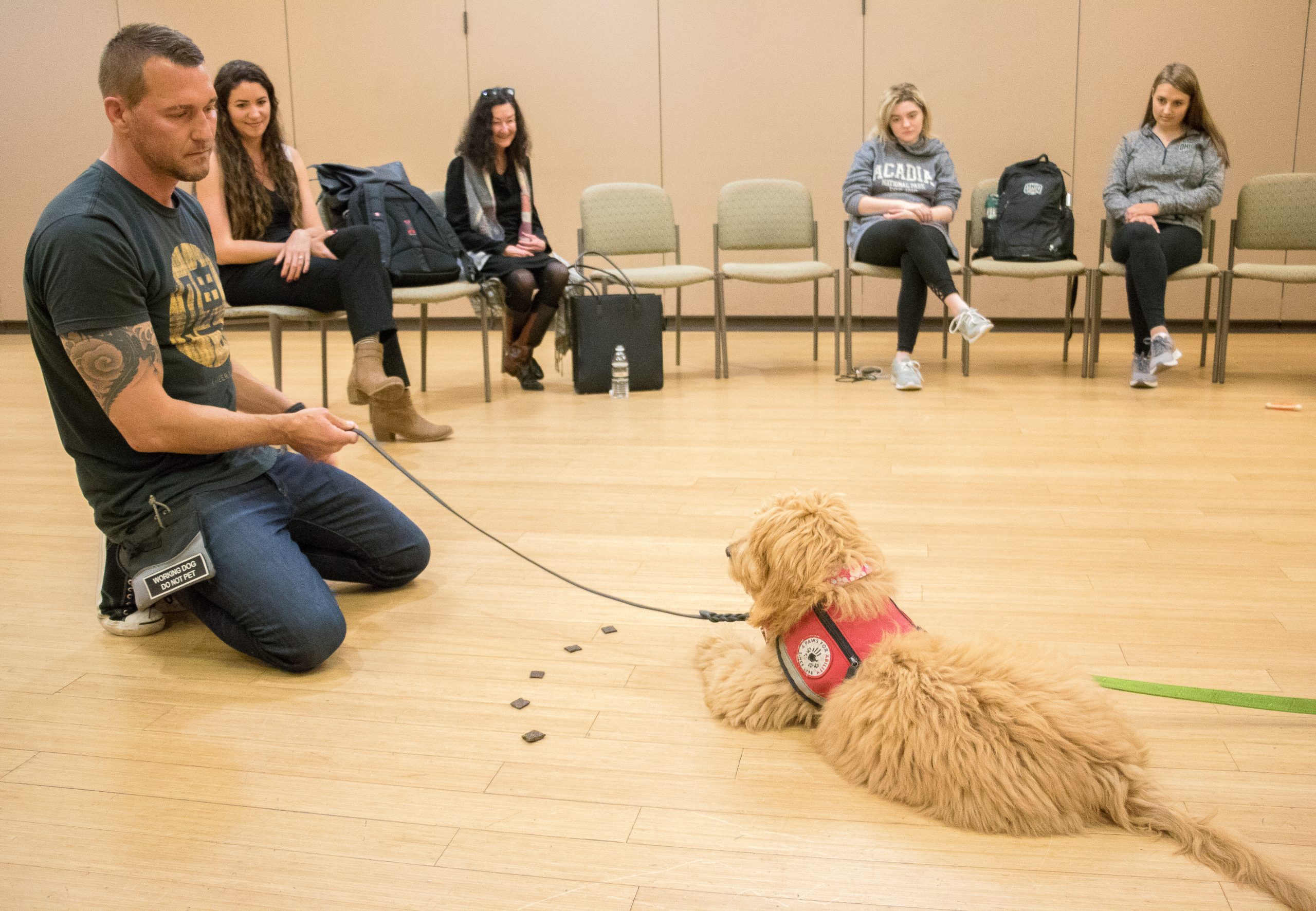Brandon McMillan, host of the CBS show Lucky Dog and celebrity dog trainer, has always had a love for animals ingrained in his DNA. He came to Ohio University on Oct. 28 as a speaker for the Kennedy Lecture Series to share his story.
McMillan’s passion can be credited to his early foundations. His dad and uncle, hailing from Northern England, ran away in their youth to Gunther Gable William’s circus. In seven years, the two progressed to owning and running their own acts.
McMillan grew up alongside wild animals, learning the art of taming and loving them. In one picture, you can see his mom holding him in one hand, feeding him with a bottle and doing the same with a baby tiger with the other.
“They were not just our animals; they were our family,” McMillan said at the lecture.
McMillan himself ran away from home when he was almost 16. He went to live in Hawaii for four years. At the time, McMillan said his life was spiraling downhill at a rapid pace. His uncle eventually caught up to him and offered him a job, which McMillan calls a deal of a lifetime.
McMillan’s uncle owned a wild animal training company in Los Angeles focused on training animals for movies and commercials. McMillan could either go work for him, or he could join the military. Not wanting to work for his family anymore, McMillan said the military. As it turns out, it wasn’t really an option for his uncle and McMillan moved to Los Angeles to join him at 19.
After enjoying the bright lights of Hollywood and feeling unstoppable, a change occurred when McMillan was in his early 20s. He started reading statistics about how many dogs are euthanized in America, which was around 20 million then.
“I can’t say I felt great fulfillment working with people who didn’t respect me or the animals,” McMillan said to the audience.
At the same time, he was living next to an animal shelter, hearing the constant barks and cries coming from the animals. One of McMillan’s uncle’s working dogs had fallen ill and McMillan bet his uncle he could turn a working dog into a movie dog. The new dog, Raven, became phenomenal.
But the biggest change came when one of McMillan’s friends called him saying that his friend in the military had been hit by an improvised explosive device (IED) in Afghanistan. That friend desperately needed a service dog. The waitlist for one agency was five years, so he needed McMillan to train one for him.
McMillan says he was initially confused and hesitant. However, he then realized that training dogs to fetch beers for Superbowl commercials required some of the same skills useful in helping a person with physical disabilities.
In just four short months, McMillan trained and delivered the dog to Walter Reid Medical Center, just outside of Washington, D.C. Word about him had spread. When he walked in, he was surrounded by 100 veterans asking him to train service a dog for them too.
He stayed and trained dogs for a few months, adapting his style to the owner’s needs. Three months later, he headed back to L.A. and quit the movie industry. He said it felt like career suicide, but kept going forward with a new mission in mind.
McMillan started a non-profit service where he trained shelter dogs and connected them to veterans and other families around the country.
“There are no untrainable dogs, just untrained humans,” McMillan said to the crowd.
In late 2012, CBS decided to cut its Saturday morning cartoons and replace them with all-age programming. Representatives approached McMillan, noting that they had caught word of what he was doing and were interested in turning it into a show They watched McMillan in action for several weeks, observing him going to the shelters, assessing the dogs and training them.
Lucky Dog aired in the fall of 2013. McMillan has rescued 156 dogs since the show started.
His training principles are based on seven common commands: sit, stay, down, come, off, heel and no.
“Tricks are fun,” McMillan says. “Tricks are always there to impress your friends, but tricks are for kids. They are not going to keep a dog out of a shelter.”
McMillan continues to train dogs for the show and for individuals, but with an increasingly hectic schedule and more demand, he hopes to start a location where he can teach multiple trainers to train dogs using his methods. His goal is to keep as many dogs out of shelters as he can.
“Because if I can train one dog, that’s one dog trained,” McMillan says. “But if I can train a group of trainers, that’s hundreds of dogs trained.”
Alexis McCurdy
Related posts
What’s Inside
- Behind the Bite (68)
- Features (124)
- In Your Neighborhood (102)
- Photo Essay (4)
- Read the Full Issue (8)
- Talking Points (48)
- The Scene (15)
- Uncategorized (3)
- Web Exclusive (5)
- What's Your Story? (21)


Find us on Social Media